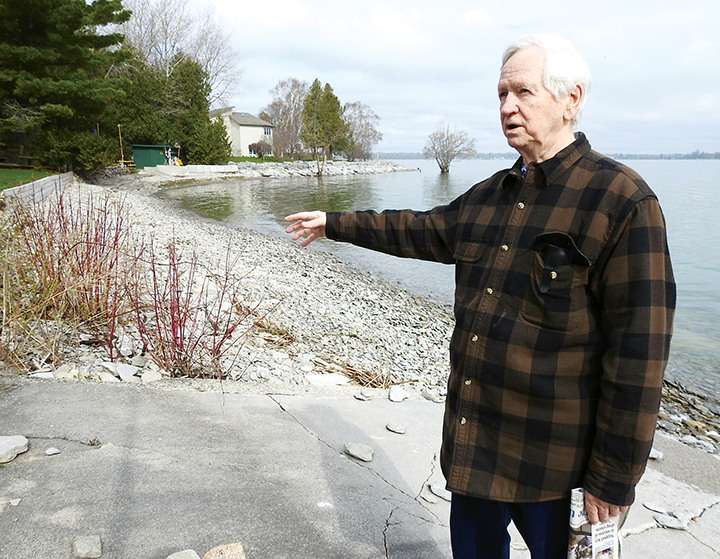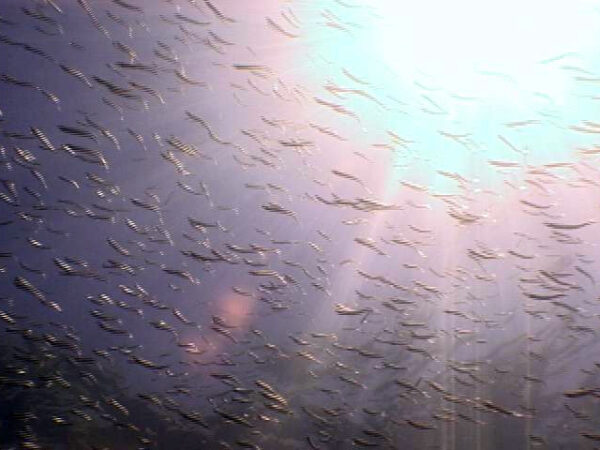
By Julie Riddle, The Alpena News
This article is part of a collaboration between The Alpena News and Great Lakes Now at Detroit Public Television to bring audiences stories about the Great Lakes, especially Lake Huron and its watershed.
ALPENA — In six days, oil escaping from under the Straits of Mackinac could reach Rogers City.
There, it could hurt wildlife, sicken residents, and coat beaches with slime, according to experts studying the possible effect of an oil spill from Line 5, Enbridge Inc.’s 68-year-old pipeline carrying crude oil across the bottom of the Straits.
Such a spill presents relatively low risk of devastating environmental impact in Alpena and Thunder Bay, according to studies. Neighbors to the northwest, in Presque Isle County, face a more realistic possibility of long-term hurt if oil escaped the pipeline.
Though insisting the pipeline is safe, Enbridge plans to relocate Line 5 into a concrete tunnel 100 feet below the lakebed through the Straits as part of a plan worked out with previous Gov. Rick Snyder.
Lawsuits by the Michigan Legislature and the Michigan Attorney General dispute Enbridge’s right to run oil through those waters. Current Gov. Gretchen Whitmer in November ordered Enbridge to stop transporting oil through the Straits and gave the company six months to comply. Enbridge’s deadline is Wednesday.
Environmental groups claim the pipeline’s location and age put lakes Michigan and Huron, which connect at the Straits, and coastline communities at risk of a disastrous oil spill, endangering the environment, local and state economies, and human health.
Enbridge maintains that shutting down the line would remove a vital fuel supply to Michiganders and hurt the state’s economy.
Both arguments are true, said David Schwab, a researcher who conducted hundreds of tests to determine possible outcomes of an oil spill from the pipeline.
“The question is,” Schwab said, “which is worse?”
Predicting the unpredictable
In 2016, Schwab, a Great Lakes oceanographer employed by the University of Michigan Water Center, with expertise in the currents through the Straits, created computer simulations of 860 scenarios of potential weather and lake conditions at the moment of an oil spill from Line 5.
Currents almost as strong as those in the Detroit River can run either direction through the Straits and change from day to day, according to Schwab.
Given the unpredictability of currents and the wide variety of weather systems in northern Michigan, the Straits present the worst point in the Great Lakes for an oil spill, Schwab said.
If 25,000 gallons leaked from the pipeline, Schwab’s tests showed about a 5% chance enough oil would make it to Thunder Bay to noticeably impact residents or the environment.
The spilled oil would arrive about 10 days after the spill.
If 10,000 gallons of oil spilled, 2% of scenarios led to oil in Thunder Bay. At 5,000 gallons, the likelihood halved.
Closer to the Straits, Rogers City lakefront homeowners stand a 25% chance a 25,000-gallon oil spill would end up in their back yards. An oil spill of 10,000 gallons still has a 20% chance of reaching Rogers City.
Hammond Bay, farther north in Presque Isle County, could get slicked by oil in as little as three days after a 25,000-gallon spill, according to Schwab’s study.
Oil that rounded the bend and headed south of Alpena would take 21 days to reach Harrisville, with a 1% chance of making it there after the largest oil spill in Schwab’s study.
Catch Great Lakes Now‘s recent episode on Line 5 here:
API key not valid. Please pass a valid API key.For and against
Even a small chance oil could make its way to Thunder Bay frightens someone with a lakeshore home, according to Clifford Malenfant, who lives on the bay’s south side.
But an underground tunnel proposed by Enbridge to prevent leaks may keep shoreline communities safe, Malenfant thinks.
Malenfant’s neighbor, Cheryl Parsons, worries about an oil spill hitting wildlife and lakefront beaches hard. The pipeline should simply shut down to protect Michigan and its residents, she thinks.
A shutdown could trigger a host of other problems for the state, though, her neighbor said.
“Six of one …,” Malenfant said.
Although the majority of petroleum products moving through Line 5 serve Canadian refineries, a shutdown would leave Michigan 756,000 gallons per day short of its supply of propane, a gas used to heat many northern Michigan homes, according to Enbridge spokesman Ryan Duffy.
Michigan would need to find another supply for 4.2 million gallons of gas, diesel, jet fuel, and propane, according to Enbridge.
Crude oil from the northern Lower Peninsula — up to 10,000 barrels a day — travels to refineries via Line 5 from at a facility in Lewiston, according to a Line 5 study commissioned by the National Wildlife Federation. If Line 5 shuts down, that oil will have to travel by truck, Duffy said.
Watch this video of University of Michigan researchers showing possible scenarios of an oil spill from Line 5:
API key not valid. Please pass a valid API key.‘Somewhere in between’
Enbridge denies allegations Line 5 is unsafe.
The company monitors the line and has upped measures to avoid anchor strikes, and any change in pressure or flow automatically shuts valves on either side of the Straits, Duffy said.
A 2018 anchor strike dented the pipeline, increasing calls for its removal from some and, for others, reinforcing the need for Enbridge’s tunnel. In October 2020, a pair of bills introduced in the Legislature — including one by state Rep. Sue Allor, R-Wolverine, who represents Northeast Michigan — would make Line 5 anchor strikes a felony.
Worries about the pipeline’s stability come a decade after a line rupture and oil spill near Marshall — estimated by Enbridge at 840,000 gallons — into the Kalamazoo River from Enbridge-owned Line 6B. One of the largest inland oil spills in U.S. history, the incident cost Enbridge $1.2 billion for a several-year cleanup.
According to Duffy, employees of the company own rings made out of pieces of Line 6 to remind them of the importance of safety.
Intentions to do better aren’t enough, according to Liz Kirkwood, executive director of environmental group For Love of Water, or FLOW.
An oil leak could cost 1.5 million jobs tied to the Great Lakes and destroy a unique freshwater ecosystem, clobbering a $7 billion fishing industry and shutting down one of the busiest shipping lanes in the Great Lakes, Kirkwood said.
More than 1.1 million gallons of oil have leaked from Line 5 in more than 30 on-land spills, according to a report released in 2017 by the Pipeline Hazardous Materials Safety Administration. The pipeline travels 645 miles, from Superior, Wisconsin, across Michigan to Sarnia, Ontario.
A 2018 study by a team of researchers used computer simulations to determine the possible effects of an oil spill on the Michigan shoreline.
Cleanup would take one to two years, and oil would endanger human health, local economies, tourism, and home values in shoreline communities, the report indicated.
The study’s predictions purposely show worst-case scenarios, according to Schwab.
The researchers creating the report picked and chose from available data to make their cases — and so do both Enbridge and opponents of Line 5, Schwab said.
“They’re picking and choosing points that support their position,” Schwab said. “The reality is somewhere in between.”
As of last month, 31 counties, including Cheboygan County and most of the Upper Peninsula, had passed resolutions supporting the Line 5 tunnel proposal, according to Enbridge. No Northeast Michigan counties passed such a resolution.
Julie Riddle can be reached at 989-358-5693, jriddle@thealpenanews.com or on Twitter @jriddleX.
Catch more news on Great Lakes Now:
Oil pipeline disputes raise tensions between U.S. and Canada
Michigan agency to include climate in tunnel permit review
Michigan tribe seeks cultural property protection in path of Line 5 project
Is the Line 5 tunnel a bridge to Michigan’s energy future or a bad deal?
API key not valid. Please pass a valid API key.Featured image: Alpena County resident Clifford Malenfant last week describes the damage he fears an oil spill could do to his Partridge Point Road home. (Photo by Julie Riddle/The Alpena News)




